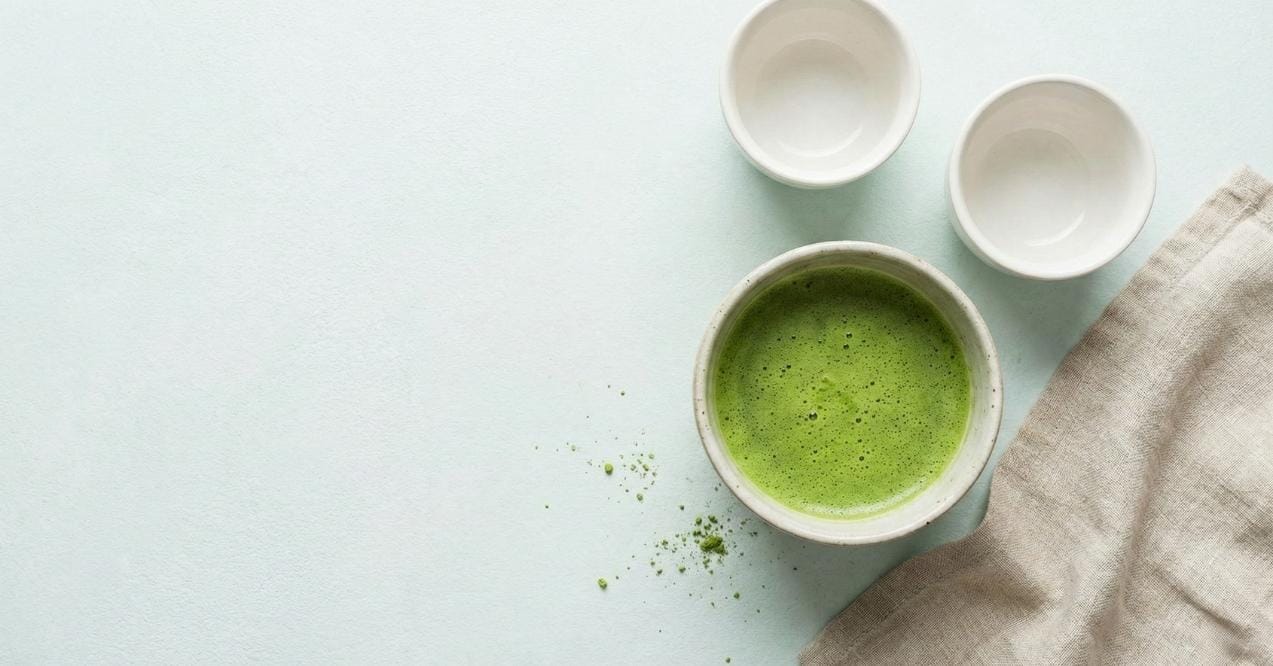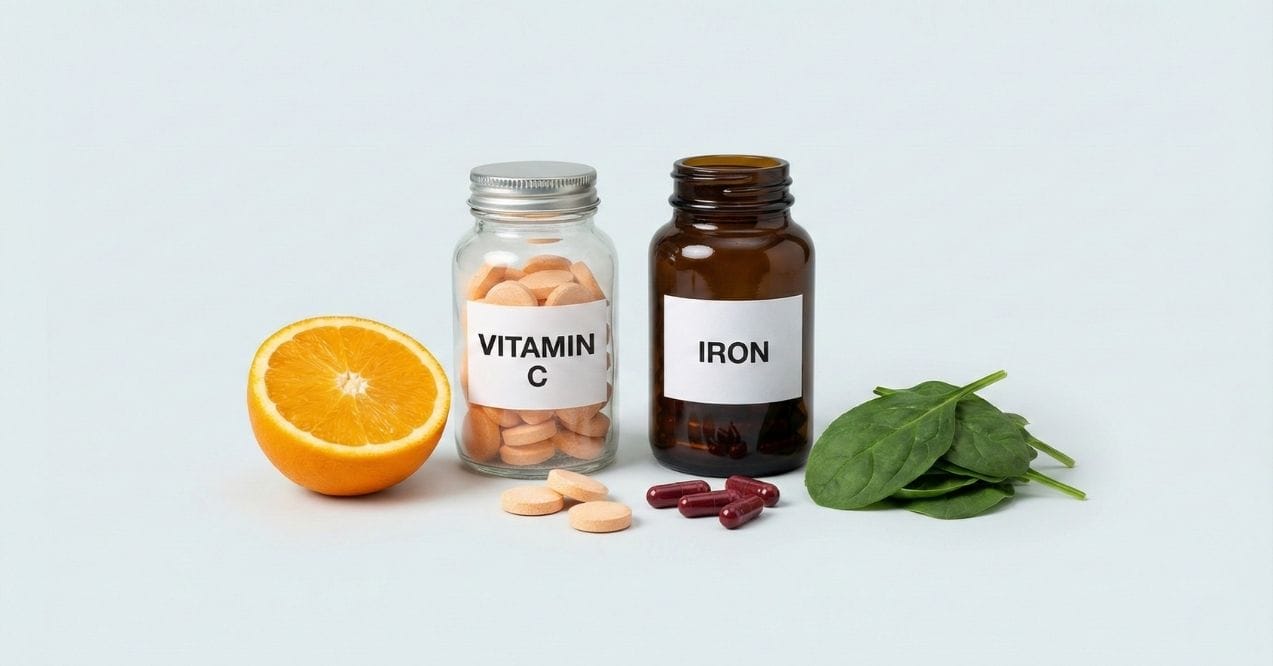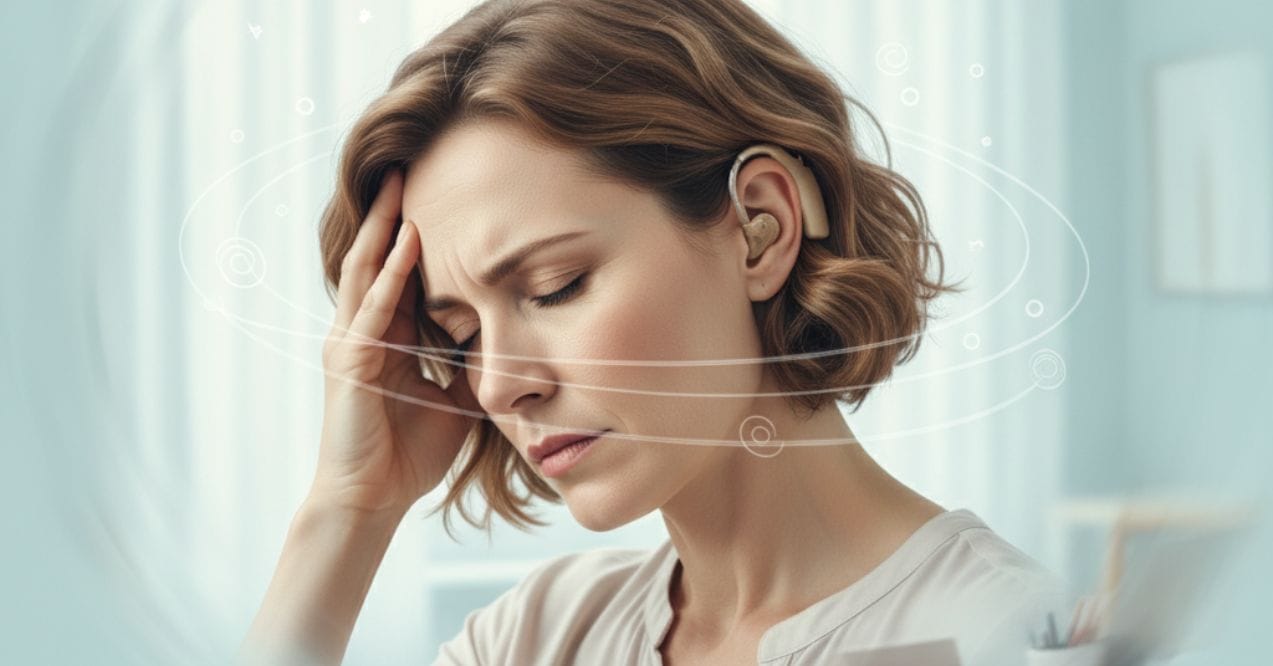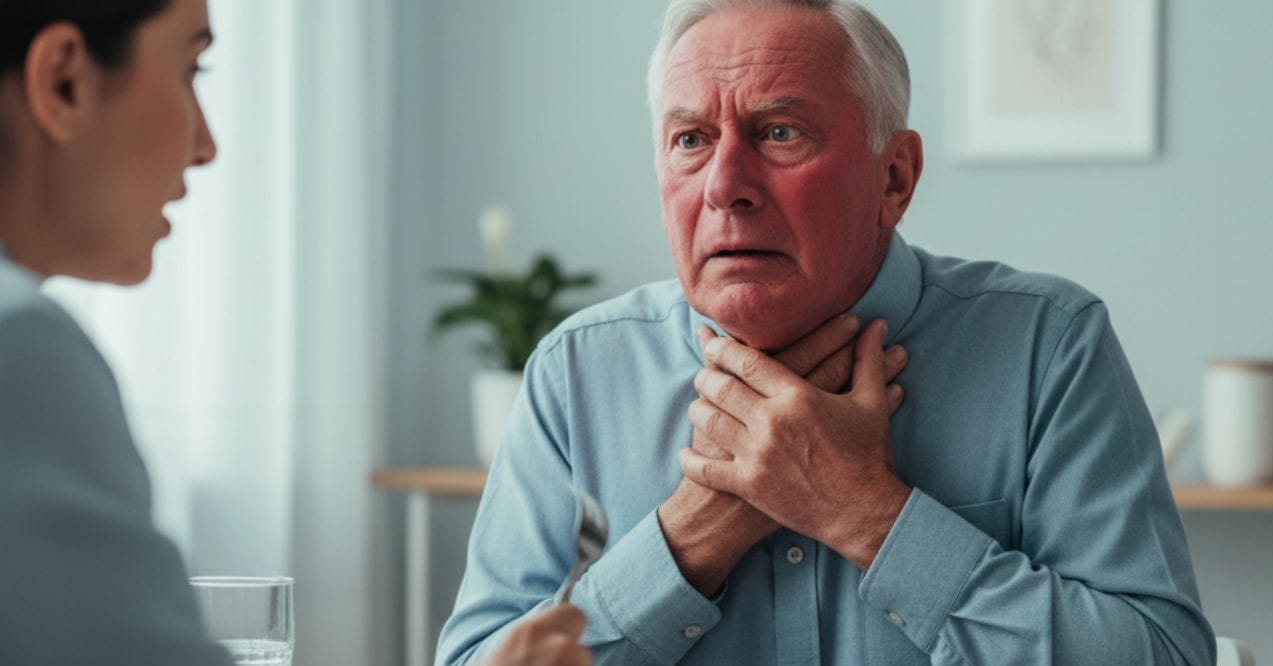Why Does Seafood Sometimes Make You Feel Tired?
Does seafood make you sleepy? Studies show seafood's omega-3 fatty acids, and histamine content may contribute to post-meal fatigue.
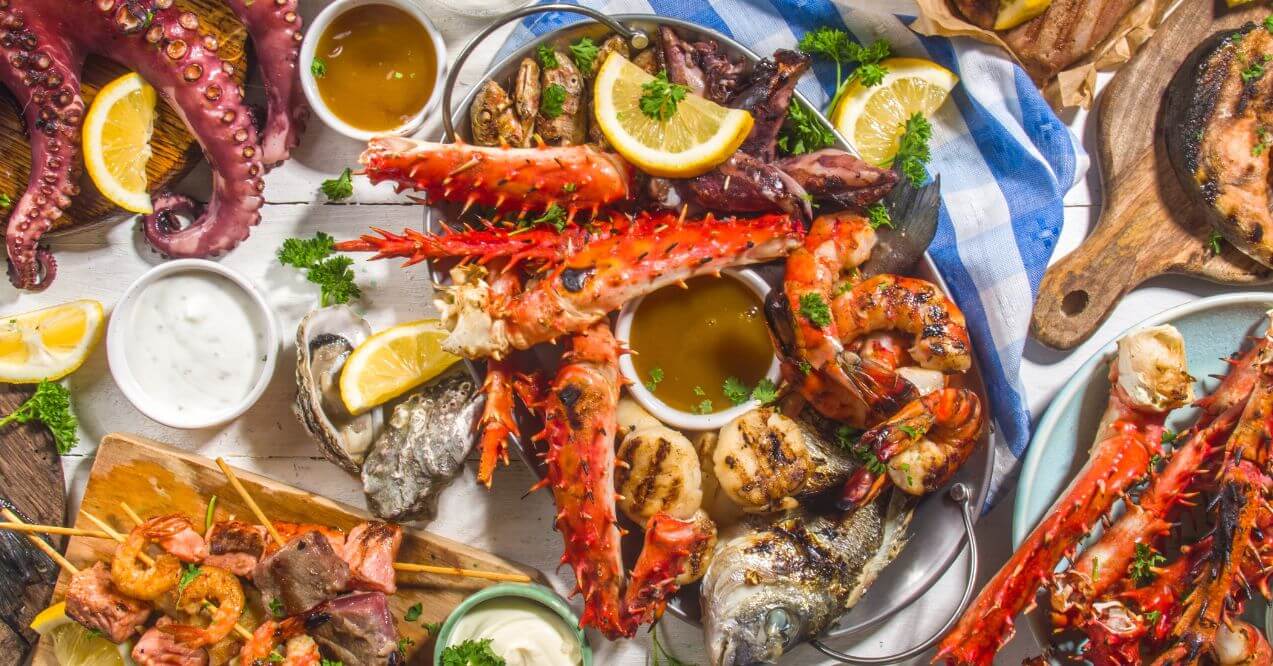

Many people report feeling drowsy after eating fish, shrimp, or other marine delicacies. This phenomenon raises an interesting question: does seafood make you sleepy, or is this just another food myth?
The connection between seafood consumption and fatigue involves several factors, from the nutrients in fish to how your body processes different foods. While some assume any protein-rich meal causes drowsiness, seafood presents unique considerations worth exploring.
Let’s examine the science behind this common experience and discover whether there’s truth to the seafood-sleepiness connection.
The Role of Tryptophan in Seafood
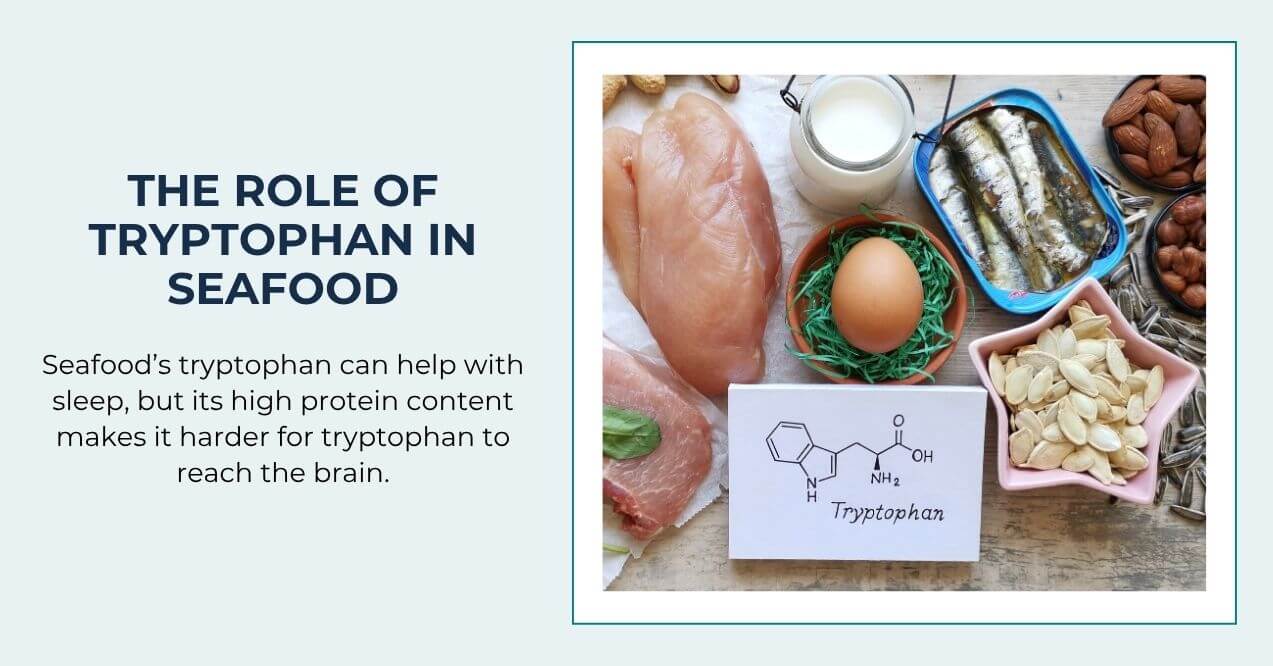
Seafood contains tryptophan, an amino acid your body uses to produce serotonin and melatonin. These chemicals play key roles in regulating mood and sleep patterns. Fish like salmon, tuna, and halibut contain moderate amounts of tryptophan.
However, the tryptophan content in seafood alone rarely causes significant drowsiness. You’d need to consume substantial portions to experience noticeable effects. The amount of tryptophan in a typical seafood serving is similar to what you’d find in chicken or eggs.
The real story is more complex. Tryptophan needs to cross into your brain to affect sleep, and it competes with other amino acids for this access. Seafood’s high protein content actually makes it harder for tryptophan to reach your brain effectively.
Omega-3 Fatty Acids and Sleep Regulation
Fatty fish like salmon, mackerel, and sardines are rich in omega-3 fatty acids. These beneficial fats may influence your sleep quality through their effects on serotonin production. Research suggests omega-3s can help regulate your body’s natural sleep-wake cycle.
Studies indicate that people with higher omega-3 levels often experience better sleep quality. The DHA component of omega-3s appears particularly important for maintaining healthy sleep patterns. This connection might explain why some people feel more relaxed after eating fatty fish.
Regular omega-3 consumption through seafood or pentadecanoic acid supplements may support overall sleep health. The effects tend to be cumulative rather than immediate, meaning one seafood meal won’t necessarily make you instantly sleepy.
The balance of omega-3 to omega-6 fatty acids in your diet also matters. Modern diets often contain too many omega-6 fats, which can interfere with omega-3 benefits. Seafood helps restore this balance, potentially improving both sleep quality and daytime energy levels over time.
Meal Size and Digestive Load
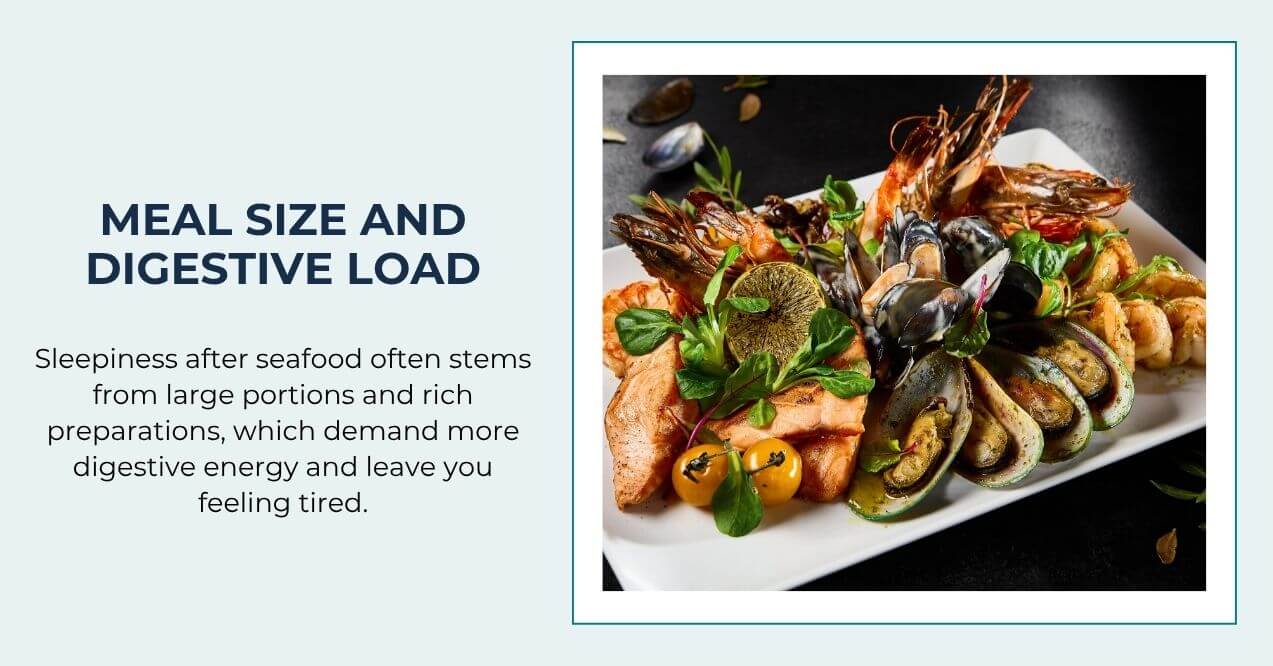
Often, the sleepiness you experience after seafood has less to do with the fish itself and more to do with how much you eat. Large portions of any food require significant energy for digestion. Your body redirects blood flow to your digestive system, which can leave you feeling tired.
Heavy seafood preparations compound this effect. Fried fish, creamy sauces, and butter-laden dishes demand even more digestive effort. The combination of proteins and fats takes longer to process than simpler meals.
Consider these digestive factors:
- Portion size directly impacts post-meal fatigue
- Rich preparations increase digestive demands
- Eating speed affects how your body processes food
- Combining seafood with heavy sides adds to the digestive load
Potential Food Sensitivities or Allergies
Some individuals experience fatigue as a symptom of mild seafood sensitivities. These reactions differ from severe allergies but can still affect how you feel after eating certain fish or shellfish. Histamine content in some seafood varieties may trigger mild reactions in sensitive people.
Possible signs of seafood sensitivity:
- Consistent tiredness after eating specific types of fish
- Mild digestive discomfort
- Slight headaches or foggy thinking
- General feelings of being unwell
If you notice these patterns, tracking which seafood types affect you can help identify triggers. Consulting with a healthcare provider can determine whether you have a true sensitivity or if other factors are at play.
Circadian Rhythms and Timing of Seafood Consumption
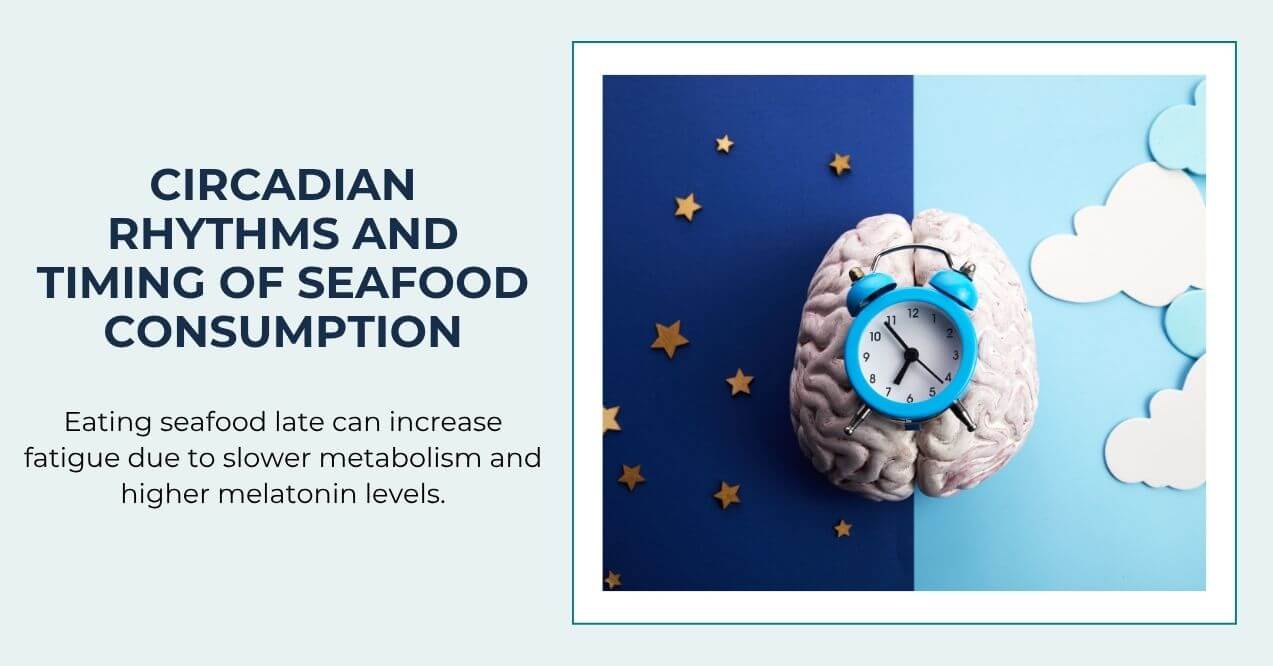
Your body’s natural circadian rhythms influence how meals affect your energy levels. Eating seafood during your body’s natural low-energy periods, typically mid-afternoon or evening, may amplify feelings of tiredness. This timing effect applies to most foods, not just seafood.
The body naturally produces more melatonin as evening approaches. When you combine this natural drowsiness with a satisfying seafood dinner, the sleepy feeling intensifies. Late dinners particularly affect sleep readiness, regardless of the food type.
Your metabolism also slows in the evening, making it harder to process heavy meals efficiently. This natural slowdown means that seafood dinners may have different effects than lunch portions. The social context of evening meals – relaxation, wine, dim lighting – further promotes drowsiness beyond what the food alone would cause.
Consider when you typically eat seafood meals. Restaurant dinners often happen later in the evening when your body already prepares for rest. The relaxed atmosphere and social setting of these meals may contribute to post-dinner fatigue as much as the food itself.
Lifestyle Tips to Combat Post-Meal Fatigue
Managing post-seafood drowsiness involves simple adjustments to your eating habits. Start by controlling portion sizes – smaller servings reduce digestive burden while still providing nutritional benefits. Choose lighter preparation methods like grilling or baking instead of heavy, fried options.
Staying hydrated throughout your meal helps digestion proceed smoothly. Water aids nutrient absorption and prevents the sluggishness that dehydration can cause. A short walk after eating stimulates circulation and helps combat that heavy feeling.
Additional strategies:
- Eating seafood earlier in the day when energy levels are naturally higher
- Pairing fish with vegetables rather than heavy starches
- Chewing thoroughly to aid digestion
- Avoiding alcohol with seafood meals, as it compounds drowsiness
For those looking to optimize their omega-3 intake without the post-meal fatigue, best supplements for men over 40 may provide benefits without the digestive load of large seafood portions.
Supporting your body’s omega-3 levels doesn’t always require large seafood meals. PureHealth Research’s Nano Powered Omega-3 offers a convenient way to maintain balanced omega-3 levels for sustained energy throughout the day. This advanced supplement uses nano-technology for enhanced absorption, helping you experience the vitality benefits of omega-3s without the potential drowsiness from heavy seafood meals.

Key Takeaways
Does seafood make you sleepy? The answer depends on multiple factors beyond the fish itself. While seafood contains sleep-related nutrients like tryptophan and omega-3s, these rarely cause immediate drowsiness in typical serving sizes. More often, meal size, preparation method, timing, and individual sensitivities play larger roles in post-seafood fatigue.
- Seafood contains nutrients like tryptophan and omega-3s that can influence sleep.
- Large, rich seafood meals may lead to increased digestive activity, causing fatigue.
- Individual sensitivities or meal timing can also play a role in post-seafood sleepiness.
- Adopting mindful eating habits and supporting overall health can mitigate these effects.
Yes, it’s common due to factors like meal size, nutrient content, and individual sensitivities. Most people experience some drowsiness after large meals, and seafood is no exception to this pattern.
Fatty fish like salmon and mackerel, which are high in omega-3s and tryptophan, may have a more noticeable effect. However, preparation method and portion size matter more than fish type.
Opt for smaller portions, avoid heavy sauces, and pair seafood with complex carbohydrates and vegetables. Eating earlier in the day and staying hydrated also helps maintain energy levels.
Not necessarily. If sleepiness is mild and not disruptive, it’s generally safe. However, consult a healthcare provider if you have concerns about consistent or severe reactions to seafood.
Sign up for our Healthy Living newsletter!
Advertisement. This site offers health, wellness, fitness and nutritional information and is designed for educational purposes only. You should not rely on this information as a substitute for, nor does it replace, professional medical advice, diagnosis, or treatment. If you have any concerns or questions about your health, you should always consult with a physician or other health-care professional. Do not disregard, avoid or delay obtaining medical or health related advice from your health-care professional because of something you may have read on this site. The use of any information provided on this site is solely at your own risk.



